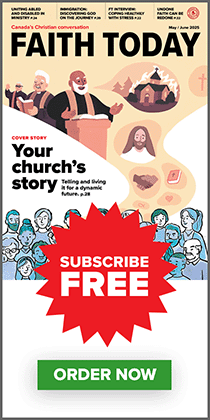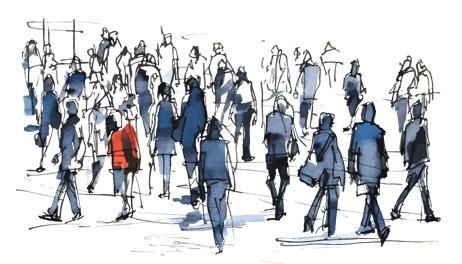Antisemitism and the public voice of the Church

→en français
Hate crimes have risen for the 6th consecutive year according to Stats Canada. And of the 1,342 crimes in 2024 judged to be motivated by religion, 68% were against Jews. Hate abounds and Jews are uniquely targeted.
A recent government report on antisemitism in Ontario schools highlighted some stories. One 13-year-old girl was surrounded on multiple days by five boys who raised their hands in a Nazi salute while shouting, “Seig Heil!” A six-year-old girl was told by her teacher she was only half human because only one of her parents is Jewish. A reported 49% of incidents were not investigated. How has antisemitism increased to such high levels?
Recently I attended a gathering of rabbis and pastors exploring ways of building relationships. One rabbi wondered whether a factor in the rise of hate is the loss of influence Christianity has had in Canada. He invoked the warning of the prophet Amos: “Behold, the days are coming . . . when I will send a famine in the land – not a famine of bread, nor a thirst for water, but of hearing the words of the Lord” (Amos 8:11).
In Canada that famine is here, he said. “The Judeo-Christian values that once upheld justice, compassion and humility before God are now being displaced by a culture that elevates self-expression over shared responsibility and subjective feelings over timeless truths.”
Upholding our society’s respect for life and the dignity of all keeps us from eugenic machinations, tribalism and outcasting.
Christianity was a powerful moral guardrail in Canada that restrained antisemitism, but the commitment to the equal dignity of all is being eroded, he said. Antisemitism thrives when “We forget that all are created in the image of God, that each of us has inherent worth and moral responsibility.”

Advocating shared human dignity and fostering a societal culture affirming equality is tantamount. When this norm wanes, in its void narcissism and tribalism thrive. Behaviours fuelled by superiority myths, envy and coveting abound. Next, indifference to suffering takes root.
Part of our witness is explaining the poisonous and corrosive nature of sin – how the complex voids of self-centredness breed enmity, thwart kindness and lead to destruction (Psalm 37:14; Proverbs 24:2, 8–9).
We manifest respect for the equal human dignity of all, even in small expressions – a kind word or an understanding ear makes a significant difference. These expressions witness to the reality of a loving God whose image we all bear.
Yet our witness also includes advocacy in shaping our laws and the governance of our public institutions. For example, in July the Supreme Court of Canada upheld legislation criminalizing prostitution for which the EFC advocated a decade ago. The underlying premise of the legislation is that prostitution is inherently exploitative. The prohibitions are designed to protect human dignity and prevent the commodification and commercialization of the human person.
Just after this decision was released, I was interviewed about another EFC intervention from 23 years ago in a Supreme Court of Canada case about patenting a genetically modified mouse and, potentially, other higher life forms. We argued patenting human life would undermine human dignity, lead to scales of human utility and commercialize human life, legalizing the ownership and trade of human life. The court agreed. Thankfully, this prohibition also remains.

Advocating for the application of biblical principles in law and public policy is crucial to everyone’s security – it is not an expression of Christian nationalism that seeks privilege or political power. Rather it is about seeking the welfare of all (Jeremiah 29:7).
Upholding our society’s respect for life and the dignity of all keeps us from eugenic machinations, tribalism and outcasting. The death camps of Nazi Germany began with the eugenic targeting of those with disabilities deemed unworthy of life along with bullying, graffiti and vandalism that targeted Jews as pariahs and people unworthy of equal dignity.
A strong voice for equal dignity is an antidote to hate and the oppression of others, hate animated by narcissism that denies the equal dignity and worth of others, casting them as things that can be used, or the perception that those who are different are less worthy. Everyone benefits when our laws affirm the sanctity of human life and the equal dignity of all.
Bruce J. Clemenger is senior ambassador and president emeritus of The Evangelical Fellowship of Canada, and author of The New Orthodoxy: Canada’s Emerging Civil Religion (Castle Quay, 2022). Illustration of people: McLura